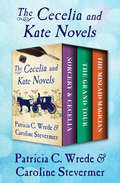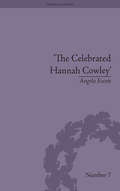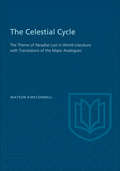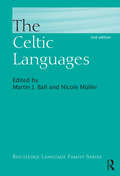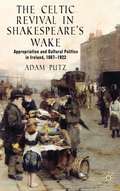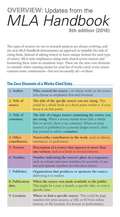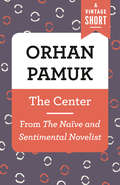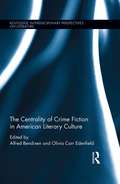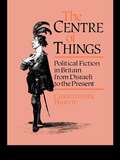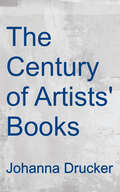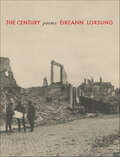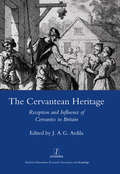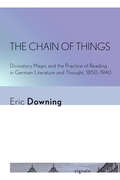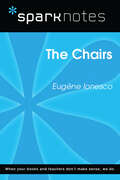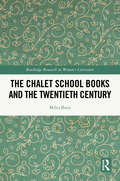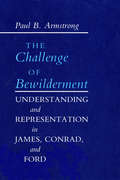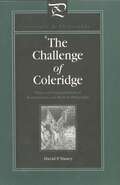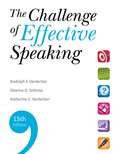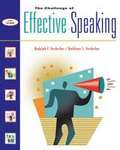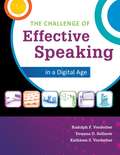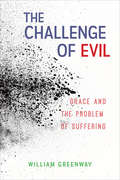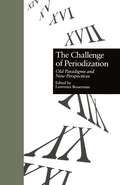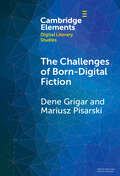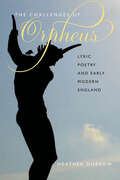- Table View
- List View
The Cecelia and Kate Novels: Sorcery & Cecelia, The Grand Tour, and The Mislaid Magician (The Cecelia and Kate Novels #3)
by Patricia C. Wrede Caroline StevermerA trio of bewitching novels featuring devoted cousins who must juggle their magical powers with their duties as ladies in Regency-era England. Enter Regency-era England—and a world in which magical mayhem and high society go hand in hand—with three novels featuring cousins Cecelia and Kate. In Sorcery & Cecelia, the two cousins have been inseparable since girlhood. But in 1817, Kate goes to London to make her debut into English society, leaving Cecelia behind to fight boredom in her small country town. While visiting the Royal College of Wizards, Kate stumbles on a plot to destroy a beloved sorcerer—and only Cecelia can help her save him. In The Grand Tour, Cecelia and Kate, along with their husbands, are inaugurating married life with a trip to the Continent. When a mysterious woman in Calais gives Cecelia a package intended for Kate&’s mother-in-law, however, the two young wives realize they must spend their honeymoons preventing an emperor-in-exile named Napoleon from reclaiming the French crown. In The Mislaid Magician, it is 1828 and the cousins are now society matrons. The steam engine is announcing its arrival and the shaking of the locomotives begins to disrupt England&’s ancient, underground magical ley lines. When the disappearance of a foreign diplomat threatens to become an international incident, Cecelia departs to fight for the future of magic—leaving Kate to care for a gaggle of disobedient, spell-casting tots. Blending history, romance, and magic, these charming novels from the author of the Enchanted Forest Chronicles will delight anyone who loves Harry Potter or Susannah Clarke&’s Jonathan Strange & Mr Norell.
The Celebrated Hannah Cowley: Experiments in Dramatic Genre, 1776–1794 (Gender and Genre)
by Angela EscottHannah Cowley (1743–1809) was a very successful dramatist, and something of an eighteenth-century celebrity. New critical interest in the drama of this period has meant a resurgence of interest in Cowley’s writing and in the performance of her plays. This is the first substantial monograph study to examine Cowley’s life and work.
The Celestial Cycle: The Theme of Paradise Lost in World Literature with Translations of the Major Analogues
by Watson KirkconnellAn anthology of translated analogues, in whole or in part, on the theme of paradise lost. <P><P>The collection is divided into two parts. Part one is the analogues and part two is a descriptive catalogue of all the analogues the author consulted. <P>The book also includes a preface and lengthy introduction. It is an indispensable resource for any serious student or scholar of Milton's Paradise Lost.
The Celtic Languages: Readings In The Brythonic Languages, Festschrift For T. Arwyn Watkins (Routledge Language Family Series #68)
by Martin J. Ball Nicole MüllerThe Celtic Languages describes in depth all the Celtic languages from historical, structural and sociolinguistic perspectives with individual chapters on Irish, Scottish Gaelic, Manx, Welsh, Breton and Cornish. This second edition has been thoroughly revised to provide a comprehensive and up-to-date account of the modern Celtic languages and their current sociolinguistic status along with complete descriptions of the historical languages. This comprehensive volume is arranged in four parts. The first part offers a description of the typological aspects of the Celtic languages followed by a scene setting historical account of the emergence of these languages. Chapters devoted to Continental Celtic, Old and Middle Irish, and Old and Middle Welsh follow. Parts two and three are devoted to linguistic descriptions of the contemporary languages. Part two has chapters on Irish, Scots Gaelic and Manx, while Part three covers Welsh, Breton and Cornish. Part four is devoted to the sociolinguistic situation of the four contemporary Celtic languages and a final chapter describes the status of the two revived languages Cornish and Manx. With contributions from a variety of scholars of the highest reputation, The Celtic Languages continues to be an invaluable tool for both students and teachers of linguistics, especially those with an interest in typology, language universals and the unique sociolinguistic position which the Celtic languages occupy. Dr Martin J. Ball is Hawthorne-BoRSF Endowed Professor, and Director of the Hawthorne Research Center, at the University of Louisiana at Lafayette. Dr Ball has over 120 academic publications. Among his books are The Use of Welsh, Mutation in Welsh, and Welsh Phonetics. Dr Nicole Müller is Hawthorne-BoRSF Endowed Professor at the University of Louisiana at Lafayette. Among her books are Mutation in Welsh, and Agents in Early Irish and Early Welsh.
The Celtic Revival in Shakespeare’s Wake
by Adam PutzThis book reconsiders the Celtic Revival by examining appropriations of Shakespeare, using close readings of works by Arnold, Dowden, Yeats and Joyce to reveal the pernicious manner in which the discourse of Anglo-Irish cultural politics informed the critical paradigms that mediated the reading of Shakespeare in Ireland for a generation.
The Cengage Essential Reference Card to the MLA Handbook for Writers of Research Papers
by Karen Mauk Cengage Learning StaffThis card outlines the essential changes to the Modern Language Association's documentation style as described in the recently published 2016 MLA HANDBOOK, Eighth Edition.
The Center: From The Naïve and the Sentimental Novelist (A Vintage Short)
by Orhan PamukA Vintage Shorts selection. Taking us through his journey as a novelist and as a reader, Nobel Prize-winner Orhan Pamuk explores, with extraordinary insight, what constitutes what he calls “the center” of a work of fiction. Looking to works by writers as varied as Herman Melville and Virginia Woolf among many others, Pamuk examines the deeper reaches that emerge when we, as writers and readers, suspend our judgments and search for meaning inside the pages of a book, encouraging us all to do the same. An ebook short.
The Centrality of Crime Fiction in American Literary Culture (Routledge Interdisciplinary Perspectives on Literature)
by Alfred Bendixen Olivia Carr EdenfieldThis collection of essays by leading scholars insists on a larger recognition of the importance and diversity of crime fiction in U.S. literary traditions. Instead of presenting the genre as the property of Dashiell Hammett and Raymond Chandler, this book maps a larger territory which includes the domains of Mark Twain, F. Scott Fitzgerald, William Faulkner, Richard Wright, Flannery O’Connor, Cormac McCarthy and other masters of fiction.The essays in this collection pay detailed attention to both the genuine artistry and the cultural significance of crime fiction in the United States. It emphasizes American crime fiction’s inquiry into the nature of democratic society and its exploration of injustices based on race, class, and/or gender that are specifically located in the details of American experience.Each of these essays exists on its own terms as a significant contribution to scholarship, but when brought together, the collection becomes larger than the sum of its pieces in detailing the centrality of crime fiction to American literature. This is a crucial book for all students of American fiction as well as for those interested in the literary treatment of crime and detection, and also has broad appeal for classes in American popular culture and American modernism.
The Centre of Things: Political Fiction in Britain from Disraeli to the Present
by Christopher Harvie`This is an excellent survey of the British political novel.' - Contemporary Review
The Century Of Artists' Books
by Johanna DruckerNow Back in Print! Johanna Drucker's The Century of Artists' Books is the seminal full-length study of the development of artists' books as a twentieth-century art form. By situating artists' books within the context of mainstream developments in the visual arts, Drucker raises critical and theoretical issues as well as providing a historical overview of the medium. Within its pages, she explores more than two hundred individual books in relation to their structure, form, and conceptualization. This latest edition of the book features a new preface by Drucker and includes an introduction by New York Times senior art critic Holland Cotter.
The Century: Poems
by Éireann LorsungA meticulously detailed catalogue of ordinary people performing acts of extraordinary violence, The Century charts an awakening to structures of dominance and violence. In the tradition of witness poetry, The Century tugs apart the quotidian horrors required to perpetuate acts of violence like the Holocaust, the deployment of nuclear weapons in Japan and Iraq, American slavery and its lingering aftermath. When Éireann Lorsung writes of death and dying, of “bodies in the fields becoming the fields,” it’s the simplicity that’s most haunting. After a fire, “some of their skin moved off of them as they ran, a very / simple melting…” But these poems don’t just witness; they also resist and serve as models for resistant lives. Pushing back against form and grammar, constructions of time and geography, Lorsung traces decades of technological, geopolitical, and cultural shifts through generations and across continents as networks of dominance continue to be stubbornly upheld. The Century is evasive but thorny, splintering in the mind. This collection is a reminder that the arrival of each new century, decade, or year brings with it an invitation to join ongoing movements of resistance, air pockets of hope in the waters that we all swim or drown in.
The Cervanrean Heritage: Reception and Influence of Cervantes in Britain
by J. A. Ardila"Many critics regard Cervantes's Don Quixote as the most influential literary book on British literature. Indeed the impact on British authors was immense, as can be seen from 17th-century plays by Fletcher, Massinger and Beaumont, through the great 18th-century novels of Fielding, Smollett, Sterne, and Lennox, and on into more modern and contemporary novelists. 20th-century critics, fascinated by Cervantes, were moved to write what we now see as the classical works of Cervantes scholarship. Through their previous publications, the eminent contributors to this volume have helped to determine the reception of Cervantes in Britain. Together they now offer a comprehensive and innovative picture of this topic, discussing the English translations of Cervantes's works, the literary genres which developed under his shadow, and the best-known authors who consciously emulated him. Cervantes's influence upon British literature emerges as decidedly the deepest of any writer outside of English and, very possibly, of any writer since the Renaissance."
The Chain of Things: Divinatory Magic and the Practice of Reading in German Literature and Thought, 1850–1940 (Signale: Modern German Letters, Cultures, and Thought)
by Eric DowningIn The Chain of Things, Eric Downing shows how the connection between divinatory magic and reading shaped the experience of reading and aesthetics among nineteenth-century realists and modernist thinkers. He explores how writers, artists, and critics such as Gottfried Keller, Theodor Fontane, and Walter Benjamin drew on the ancient practice of divination, connecting the Greek idea of sympathetic magic to the German aesthetic concept of the attunement of mood and atmosphere.Downing deftly traces the genealogical connection between reading and art in classical antiquity, nineteenth-century realism, and modernism, attending to the ways in which the modern re-enchantment of the world—both in nature and human society—consciously engaged ancient practices that aimed at preternatural prediction. Of particular significance to the argument presented in The Chain of Things is how the future figured into the reading of texts during this period, a time when the future as a narrative determinant or article of historical faith was losing its force. Elaborating a new theory of magic as a critical tool, Downing secures crucial links between the governing notions of time, world, the "real," and art.
The Chairs (SparkNotes Literature Guide Series)
by SparkNotesThe Chairs (SparkNotes Literature Guide) by Eugene Ionesco Making the reading experience fun! Created by Harvard students for students everywhere, SparkNotes is a new breed of study guide: smarter, better, faster.Geared to what today's students need to know, SparkNotes provides:chapter-by-chapter analysis explanations of key themes, motifs, and symbols a review quiz and essay topicsLively and accessible, these guides are perfect for late-night studying and writing papers.
The Chalet School Books and the Twentieth Century (Routledge Research in Women's Literature)
by Miles BooyThe first full-length study of this beloved children’s series, The Chalet School in the Twentieth Century moves beyond the largely generic analysis within which it has previously been discussed. Published between 1925 and 1970, the series moves from European reconciliation after the Great War, through a second global conflict to a post-war world increasingly defined by increased secularity and emerging consumerism. Reproducing cover illustrations, Miles Booy’s book examines both those issues which author Elinor M. Brent-Dyer consciously explored (such as the exceptional The Chalet School in Exile, which she sought to explain the Nazi occupation of Austria to her young readers) and those aspects of the text which must be read symptomatically. This is a book which will engage students with historical and cultural interests beyond children’s literature. With barely a midnight feast in sight, but much anxiety about social change, it’s a familiar genre, but not as you think you know it. Hurry up, new girls, class is about to begin...
The Challenge of Bewilderment: Understanding and Representation in James, Conrad, and Ford
by Paul B. ArmstrongThe Challenge of Bewilderment treats the epistemology of representation in major works by Henry James, Joseph Conrad, and Ford Madox Ford, attempting to explain how the novel turned away from its traditional concern with realistic representation and toward self-consciousness about the relation between knowing and narration. Paul B. Armstrong here addresses the pivotal thematic experience of "bewilderment," an experience that challenges the reader’s very sense of reality and that shows it to have no more certainty or stability than an interpretative construct. Through readings of The Sacred Fount and The Ambassadors by James, Lord Jim and Nostromo by Conrad, and The Good Soldier and Parade’s End by Ford, Armstrong examines how each writer dramatizes his understanding of the act of knowing. Armstrong demonstrates how the novelists’ attitudes toward the process of knowing inform experiments with representation, through which they thematize the relation between the understanding of a fictional world and everyday habits of perception. Finally, he considers how these experiments with the strategies of narration produce a heightened awareness of the process of interpretation.
The Challenge of Coleridge: Ethics and Interpretation in Romanticism and Modern Philosophy (Literature and Philosophy)
by David HaneyInterweaving past and present texts, The Challenge of Coleridge engages the British Romantic poet, critic, and philosopher Samuel Taylor Coleridge in a "conversation" (in Hans-Georg Gadamer’s sense) with philosophical thinkers today who share his interest in the relationship of interpretation to ethics and whose ideas can be both illuminated and challenged by Coleridge’s insights into and struggles with this relationship.In his philosophy, poetry, theology, and personal life, Coleridge revealed his concern with this issue, as it manifests itself in the relation between technical and ethical discourse, between fact and value, between self and other, and in the ethical function of aesthetic experience and the role of love in interpretation and ethical action.Relying on Gadamer’s hermeneutics to supply a framework for his approach, Haney connects Coleridge’s ideas with, among others, Emmanuel Levinas’s other-oriented notion of ethical subjectivity, Paul Ricoeur’s view about the other’s implication in the self, reinterpretations of Greek drama by Bernard Williams and Martha Nussbaum, and Gianni Vattimo's post-Nietzschean hermeneutics.Coleridge is treated not as a product of Romantic ideology to be deconstructed from a modern perspective, but as a writer who offers a "challenge" to our modern tendency to compartmentalize interpretive issues as a concern for literary theorists and ethical issues as a concern for philosophers. Looking at the two together, Haney shows through his reading of Coleridge, can enrich our understanding of both.
The Challenge of Effective Speaking
by Rudolph F. Verderber Kathleen S. Verderber Deanna D. SellnowDo you want to ace your public speaking course? All you need to know, including all of the skills that will help you become a confident speaker and conquer speaking anxiety, are thoroughly covered in THE CHALLENGE OF EFFECTIVE SPEAKING, 15e. A favorite with students, this best seller guides you through six key "Speech Planning Action Steps". The result? You'll learn how to prepare and deliver strong speeches that get you good grades in your public speaking course! You'll be guided through topic selection, audience analysis and adaptation, effective research (including appropriate use of Internet resources), organization (with an emphasis on outlining), and language and delivery. The new 15th edition of this nationwide best seller also including many online tools, including videos of actual student speeches accompanied by Interactive Video Activities that help you develop and strengthen your public speaking skills. Authors Rudy and Kathie Verderber, together with new coauthor Deanna D. Sellnow, have grounded this new edition with the latest research to give you an exceptional resource for creating and delivering your speeches.
The Challenge of Effective Speaking (12th edition)
by Rudolph F. Verderber Kathleen S. VerderberThis textbook introduces the skills of public speaking and applies them to work-related meetings, personal business transactions, and personal relationships. The authors describe how to develop confidence, listen effectively, analyze the audience, research information, organize ideas, practice delivery, and speak persuasively. Annotation ©2004 Book News, Inc., Portland, OR (book news.com)
The Challenge of Effective Speaking in a Digital Age (Sixteenth Edition)
by Rudolph F. Verderber Kathleen S. Verderber Deanna D. SellnowAll the skills you need to know to become a confident speaker and conquer speaking anxiety are thoroughly covered in THE CHALLENGE OF EFFECTIVE SPEAKING IN A DIGITAL AGE, 16E. A pioneer in the field, this best seller guides you through six key Speech Planning Action Steps: topic selection, audience analysis and adaptation, effective research (including appropriate use of Internet resources), organization (with an emphasis on outlining), presentational aids (and how to avoid succumbing to "death by PowerPoint"), and language and delivery. The new edition also includes many online tools, such as videos of student speeches accompanied by Interactive Video Activities that help develop and strengthen public speaking skills. Grounded in the latest research, this new edition is an exceptional resource for creating and delivering speeches.
The Challenge of Evil: Grace And The Problem Of Suffering
by William GreenwayBelief in God in the face of suffering is one of the most intractable problems of Christian theology. Many respond to the spiritual challenge of evil by ignoring it, blaming God, or insisting on the inherent meaninglessness of life. In this book, William Greenway contends that we don't have to deny our moral selves by either ignoring evil or abandoning our moral sensibilities toward it. We can open our eyes fully to suffering and evil, and our own complicity in them. We can do so because it is only in this full acceptance of the world's guilt and our own that we make ourselves fully open to agape, to being seized by love of others and God. Inspired by the Jewish philosopher Emmanuel Levinas and the Christian novelist Fyodor Dostoyevsky, The Challenge of Evil lovingly explains how we can look squarely at the overwhelming suffering in the world and still, by grace, have faith in a good and loving God.
The Challenge of Periodization: Old Paradigms and New Perspectives
by Lawrence BessermanFirst published in 1996. Routledge is an imprint of Taylor & Francis, an informa company.
The Challenge of Rousseau
by Christopher Kelly Eve GraceWritten by prominent scholars of Jean-Jacques Rousseau's philosophy, this collection celebrates the 300th anniversary of Rousseau's birth and the 250th anniversary of the publication of Emile. The depth and systematic character of Rousseau's thought was recognized almost immediately by thinkers such as Kant and Hegel, yet debate continues over the degree to which Rousseau's legacy is the result of poetic, literary, or rhetorical genius, rather than of philosophic rigor or profundity. The authors focus on Rousseau's genuine yet undervalued stature as a philosopher. This collection includes essays that develop some of the complex problems Rousseau treated so radically and profoundly, as well as essays on the vigorous debates he engaged in with thoughtful contemporaries and predecessors.
The Challenges of Born-Digital Fiction: Editions, Translations, and Emulations (Elements in Digital Literary Studies)
by Dene Grigar Mariusz PisarskiThe Challenges of Born-Digital Fiction: Editions, Translations, and Emulations addresses the growing concern about how best to maintain and extend the accessibility of early interactive novels and hypertext fiction or narratives. These forms of born-digital literature were produced before or shortly after the mainstreaming of the World Wide Web with proprietary software and on formats now obsolete. Preserving and extending them for a broad study by scholars of book culture, literary studies, and digital culture necessitate they are migrated, translated, and emulated – yet these activities can impact the integrity of the reader experience. Thus, this Element centers on three key challenges facing such efforts: (1) precision of references: identifying correct editions and versions of migrated works in scholarship; (2) enhanced media translation: approaching translation informed by the changing media context in a collaborative environment; and (3) media integrity: relying on emulation as the prime mode for long-term preservation of born-digital novels.
The Challenges of Orpheus: Lyric Poetry and Early Modern England
by Heather Dubrow2008 Outstanding Academic Title, Choice MagazineAs a literary mode "lyric" is difficult to define precisely. While the term has conventionally been applied to brief, songlike poems expressing the speaker's interior thoughts critics have questioned many of the assumptions underlying this definition, calling into doubt the very possibility of self-expression in language.Whereas much recent scholarship on lyric has centered on the Romantic era, Heather Dubrow turns instead to the poetry of early modern England. The Challenges of Orpheus confronts widespread assumptions about lyric, exploring such topics as its relationship to its audiences, the impact of material conditions of production and other cultural pressures, lyric's negotiations of gender, and the interactions and tensions between lyric and narrative. Offering fresh perspectives on major texts of the period—from Wyatt's "My lute awake" to Milton's Nativity Ode—as well as poems by lesser-known figures, Dubrow extends her critical conclusions to poetry in other historical periods and to the relationship between creative writers and critics, recommending new directions for the study of lyric and of genre.
